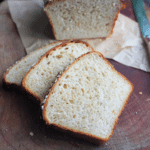Ingredients
For the oats
- ¾ cup (64g) old-fashioned rolled oats (see note 1)
- ⅔ cup (160) ml boiling water
- 2 Tablespoons (28g) unsalted butter
For the dough
- 3 cups (360g) bread flour (or all-purpose flour) (see note 2)
- ¼ cup (80g) honey (or white granulated sugar)
- 2 teaspoons (7g) instant or rapid-rise yeast (see note 3 if using active dry yeast)
- 1 teaspoon salt
- ½ cup (120 ml) lukewarm water (leave out if using active dry yeast see note 3)
To glaze before baking
- 2 Tablespoons milk or one beaten egg
- 2 Tablespoons old-fashioned rolled oats (to sprinkle before baking)
Instructions
Soak the oats (10 minutes)
- In a medium bowl, combine ¾ cup (64g) old-fashioned rolled oats⅔ cup (160) ml boiling water and 2 Tablespoons (28g) unsalted butter
- Stir everything together and leave to soak for 10 minutes.
Make the dough
- To the bowl with the oats, add 3 cups (360g) bread flour (or all-purpose flour), ¼ cup (80g) honey , 2 teaspoons (7g) instant or rapid-rise yeast, 1 teaspoon salt and ½ cup (120 ml) lukewarm water
- Mix with a stand mixer fitted with a dough hook for 8 minutes, or knead by hand for 10–12 minutes, until the dough is smooth and slightly sticky.
Let the dough rise (1 hour)
- Grease a bowl, place the dough inside, and cover it with plastic wrap. Let it rise for 1 hour or until doubled in size.
Shape the loaf
- Grease an 8½ x 4½-inch loaf pan (22 x 11 cm) (see note 4 for alternate pan)
- Deflate the dough and turn it out onto a lightly floured surface. Shape it into a rectangle, then start rolling from the shorter end.
- Roll tightly into a log, tucking in the ends and pinching the seam to seal.
Let the shaped dough rise (35-40 minutes)
- Place the dough seam-side down in the pan and let it rise for 35 - 40 minutes, or until it’s about ½ inch (1.3 cm) above the edge of the pan.
Bake
- Preheat your oven to 375°F (190°C) or 350°F (175°C) if using a fan oven.
- Brush the top of the loaf 2 Tablespoons milk or one beaten egg and sprinkle with 2 Tablespoons old-fashioned rolled oats
- Bake for 30–35 minutes on the middle rack until golden brown. The loaf should sound hollow when tapped on the bottom.
- Let the loaf cool for 5 minutes in the pan, then transfer it to a wire rack to cool completely before slicing.
Storage
- Room temperature: Once the bread has cooled completely, store it in an airtight container or wrap it tightly in plastic wrap. It will stay fresh at room temperature for up to 3 days.
- Freeze: For longer storage, you can freeze the loaf for up to 3 months. Just slice it before freezing for easy access to individual pieces. To thaw, simply leave the slices at room temperature or toast them from frozen.
Scroll up for step-by-step photos to help you make the recipe perfectly every time 😊
Recipe Notes
1. Best Oats for This Recipe: This recipe works best with old-fashioned rolled oats because they soften when soaked, giving the bread a great texture.
Oats to Avoid:
2. Flour Substitution: Bread flour gives the loaf a chewier texture, but you can substitute it with all-purpose flour.
3. Yeast Type (Check the Label): I use instant or rapid-rise yeast in this recipe because you can mix it straight into the dry ingredients, no need to dissolve it in water first. If your yeast says active dry yeast on the package, follow these steps:
4. Pan Size: If you don’t have an 8½ x 4½-inch (22 x 11 cm) pan, you can use a 9x5-inch (23 x 13 cm) pan.
- Instant oats – Too fine and can become overly soft.
- Steel-cut oats – Too firm and won’t soften enough.
2. Flour Substitution: Bread flour gives the loaf a chewier texture, but you can substitute it with all-purpose flour.
- The loaf will be slightly softer but still delicious.
3. Yeast Type (Check the Label): I use instant or rapid-rise yeast in this recipe because you can mix it straight into the dry ingredients, no need to dissolve it in water first. If your yeast says active dry yeast on the package, follow these steps:
- Dissolve 2 teaspoons of yeast in ½ cup lukewarm water (110°F/43°C).
- Wait 5 minutes until it looks frothy.
- Add it to the soaked oats mixture with the other ingredients.
- Leave out the extra water listed in the dough section—the water used to activate the yeast is already enough.
4. Pan Size: If you don’t have an 8½ x 4½-inch (22 x 11 cm) pan, you can use a 9x5-inch (23 x 13 cm) pan.
- The loaf will be a bit wider, but it will still bake perfectly.
- It might bake faster, so start checking around 25 minutes, but it could take up to 35 minutes depending on your oven.
